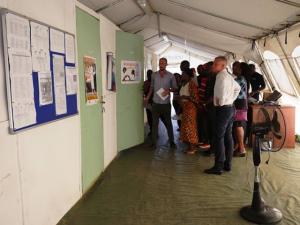Ebola persistence study site handed over to Lungi Hospital
FREETOWN, 13 January 2017 --- One of the two sites used in the second phase of the Sierra Leone Ebola Virus Persistence Study was handed over to the Lungi Government Hospital on Thursday 12 January after the closure of the study. The facility and equipment which included three large tents, office materials, hygiene materials and other supplies will be repurposed for antenatal care and services for people living with HIV/AIDS.
The handover took place at a ceremony that was attended by the study team, senior representatives from the Ministries of Health and Sanitation and Defence, the World Health Organization, the Sierra Leone Association of Ebola Survivors, the Lungi Hospital management, senior community leaders and other partners.
Speaking at the event, Dr. Anders Nordström, WHO Representative in Sierra Leone commended the commitment shown by the participants, study team and partners to shed light on critically important questions and concerns relating to Ebola virus disease. “When published, the study is likely to become one of the most significant investigations of post-Ebola infection in patients that survived the disease”, he added.
Dr. Nordstrom also noted the contribution of the study to building research capacity in Sierra Leone. Dr. James, the Superintendent of Lungi Government Hospital, reiterated this statement, adding that the team gained very valuable knowledge and skills through the research process. He also expressed gratitude for the handover of the site, which he said will help address overcrowding in clinics for Maternal and Child Health and HIV at the Lungi facility.
The Lungi Government Hospital was one of the two sites used for a study conducted jointly by the Sierra Leone Ministry of Health and Sanitation, the Ministry of Defence, WHO, US Centres for Disease Control and Prevention (CDC) and China-CDC, which assessed persistence of the Ebola virus in the body fluids of Ebola survivors. The other study site was the Military Hospital 34 in Freetown, directed by Professor Brig. General Foday Sahr. A total of 340 survivors of Ebola Virus Disease participated in the study including 220 males and 120 females across both sites.
Preliminary results of the study were published in the New England Journal of Medicine in October 2015. The analysis of the semen from the first 100 men recruited for the research showed the presence of Ebola virus genetic material (RNA) for several months after recovering from the disease.
However, one of the Principal Investigators of the study, Dr. Gibrilla F. Deen, indicated that the residual persistence of the virus in body fluids diminishes and disappears completely with the passage of time. There has not been any new confirmed case of Ebola in the country since the flare up in February 2016, which happened three months after the end of the major outbreak in November 2015.
Through the course of the study, various body fluids from male and female Ebola survivors have been tested for presence of Ebola virus. All participants received follow-up till the Ebola virus was undetected twice in a row in all samples tested. They also received counselling on safe sexual practices along with condoms, as well as the possibility to get tested for HIV/AIDS and pregnancy tests.
Final results of the study are expected to be published later in the year.
For more information contact:
Laura Keenan, keenanl [at] who.int, +232 78 633 952
